The 5 Biggest Misconceptions About INFJs
INFJs are one of the most talked-about and written about personality types on the internet. Regarded as the rarest personality type, surprisingly they seem to have more articles dedicated to them than do any of the other types.
INFJs are supposed to make up a mere 2.3% of the population, but if you run a survey in most groups, a surprising number people there will have been typed as INFJ. It gets even more confusing when you read articles about INFJs. If you look through a variety of online articles about INFJs, you’ll see that they are basically a combination of every other personality type! I myself mistyped as an INFJ for many years. Why does this happen so much? I had a sneaking suspicion as to why, but I decided to experiment.
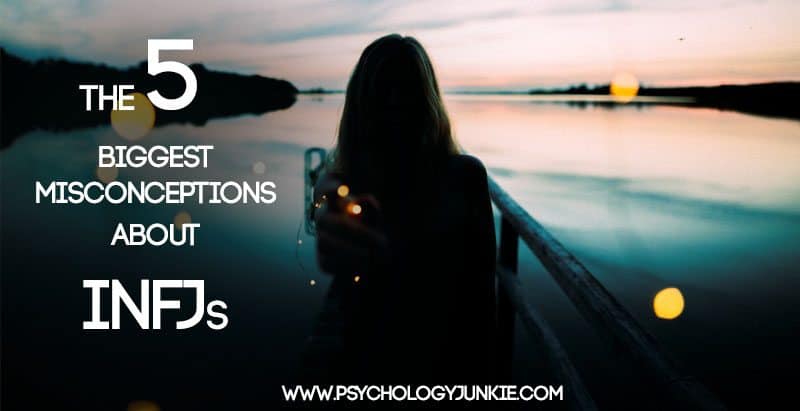
I asked an ESTJ, two ESFJs, two ISFJs, an INFP, two ISFPs, and two ENTPs to take two popular free online tests. I didn’t tell them why I wanted them to do this, just that I wanted to see if they got the same result as they did through the official MBTI®. They all got an INFJ result, except for one of the ENTPs who got an ENFP result. These slapped together online indicators are creating an abundance of mistyped people who are then writing about the INFJ type from their own perspective (which may indeed be the perspective of another personality type). As a result, many misconceptions abound about INFJs and I’m hoping today’s article can help to clear some of them up.
Not sure what your personality type is? Take our new personality questionnaire here. Or you can take the official MBTI® here.
Table of contents
Estimated reading time: 9 minutes
Misconception #1 – INFJs are Extremely Sensitive and Emotionally Intense
One thing that seems to be largely ignored in the personality community is that INFJs are intuitives first and feelers second. For the INFJ, the air they live and breathe is intuition. Understanding background processes, deciphering future implications, or reflecting on patterns and possibilities are things that they naturally gravitate towards. INFJs can certainly spend time dwelling on their own emotions and they can be sensitive, but it’s more frequent among IxFP personality types. INFJs use a mental process called Extraverted Feeling, and this function is more concerned with analyzing outer emotions than inner ones. As a result, INFJs may struggle when trying to sift through their own emotions.
Blogger Heidi Priebe describes it well when she says, “Because so many IxFP types misidentify as INFJs, INFJs often develop a reputation for being incredibly emotional dreamers – when in reality, they’re much more intellectual and discerning than they are emotional and imaginative.” See more of Heidi’s article here.
Can INFJs be emotional and sensitive? Yes. All types can be, but it’s generally not their main focus.
Sources: Psychological Types (The Collected Works of C. G. Jung, Vol. 6) (Bollingen Series XX)
My True Type: Clarifying Your Personality Type, Preferences & Functions
How Mistypes Have Warped the Descriptions of Each MBTI Type
Types who are more emotionally in-tune with themselves: INFPs and ISFPs
Misconception #2 – INFJs are Extremely Detail-Oriented
I see a lot of INFJ memes and articles that talk about how they are so detail conscious. They “see everything” apparently. I’ve heard people talk about how INFJs have to have their houses neatly in order and they notice every little thing that is out of place.
I have to respectfully disagree.
INFJs are usually very unaware of the concrete details of their environment. Because INFJs have inferior sensing they usually gloss over details unless they pertain to people or the big picture. In general the details of life aren’t what interest INFJs as much as meanings and possibilities. INFJs tend to take in an overall impression of the atmosphere around them, but can be very blind to the details of their environment.
“Dealing with details, especially in an unfamiliar environment, can trigger inferior Extraverted Sensing (Se) in Introverted Intuitive types. In fact, these types frequently mention that feeling overwhelmed by details often provokes characteristic inferior function reactions.
– Naomi Quenk, Was That Really Me?: How Everyday Stress Brings Out Our Hidden Personality
Sources:
The MBTI® Manual – A Guide to the Development and Use of the Myers-Briggs Type Indciator® Instrument
Was That Really Me?: How Everyday Stress Brings Out Our Hidden Personality
Types who are more detail-conscious: ISFJs, ESFJs, ISFPs
Misconception #3 – INFJs are Ambiverts
Because INFJs use Extraverted Feeling as their auxiliary function, they often get classified as ambiverts more than introverts. In social settings they can seem warm and gregarious. This is partially because they crave harmonious environments and value tact and overall good feelings. Awkward silences can make them feel like the harmony has been disrupted and they may appear more talkative than usual.
But INFJs are indeed true introverts.
Carl Jung himself said of INJs, “As their main activity is directed inwards, nothing is outwardly visible but reserve, secretiveness…uncertainty, and an apparent groundless embarrassment…When anything does come to the surface, it is generally an indirect manifestation of the inferior and relatively unconscious functions…Accordingly they are mostly underestimated, or at least misunderstood.”
“They (INFJs) prefer time away from external stimulation and mundane details in order to access their rich internal process.”
– Dario Nardi
While auxiliary feeling does allow INFJs to engage socially with a certain adaptability and awareness, they definitely need a lot of alone time so they can allow their Intuition to process and synthesize the information they’ve picked up throughout the day.
Sources: Psychological Types (The Collected Works of C. G. Jung, Vol. 6) (Bollingen Series XX)
Gifts Differing: Understanding Personality Type
Misconception #4 – INFJs Are Psychic
INFJs are masters of pattern-recognition and can easily be misconstrued as having some kind of “magical” foresight. The truth is much more technical.
INFJs gather copious amounts of information via their inferior function, Extraverted Sensation (or “Se” for short). Se is highly aware of concrete details and activity going on in the environment. However, unlike ESxPs who are Se-dominant, INJs don’t instantly react to or identify this information. Instead, they collect all this sensory data in a jumble in their mind. Their intuition works to synthesize this information, along with existing subconscious information, as if it’s assembling a puzzle or finding a way through a maze to a hidden insight. The INFJ then gets an epiphany or revelation about what is happening and how certain events may unfold. They can easily sense “the brewing storm”, but it’s because they are constantly running this intuitive process in their mind, piecing together clues.
“Once finished, Ni generates an impression that seems to come out of “nowhere.” But the fact is that the intuition did not come out of nowhere, but from a synthesis of sensory data gathered from the immediate environment combined with information from the INJ’s own psyche.”
– Dr. A.J. Drenth, Introverted Intuition
Sources: My True Type: Clarifying Your Personality Type, Preferences & Functions
Psychological Types (The Collected Works of C. G. Jung, Vol. 6) (Bollingen Series XX)
Neuroscience of Personality: Brain Savvy Insights for All Types of People
Misconception #5 – INFJs Know You Better Than You Know Yourself
No….no, no, no, no, no. This is why people call INFJs “special snowflakes” and find articles about them annoying and superior sounding. INFJs are gifted at picking up on patterns in human behavior, and they might be able to tell you (if you ask) which steps could lead in different directions. This doesn’t mean they know your entire past, history, experiences, or what made you who you are. They may be able to understand your emotional state before you blatantly spell it out, but that doesn’t mean they’re all empaths. To say something as incredibly arrogant as “I know you better than you know yourself” is insulting and belittling and certainly not kind or intelligent. INFJs, like anyone, can be duped or wrong.
Source: Common sense
The INFJ personality type is unique and wonderful in so many ways. But so are all fifteen other personality types. I hope this article has cleared up some of the misconceptions…what do you think? Let me know your thoughts in the comments!
Find out more about your personality type in our eBooks, Discovering You: Unlocking the Power of Personality Type or The INFJ – Understanding the Mystic. You can also connect with me via Facebook, Instagram, or Twitter!
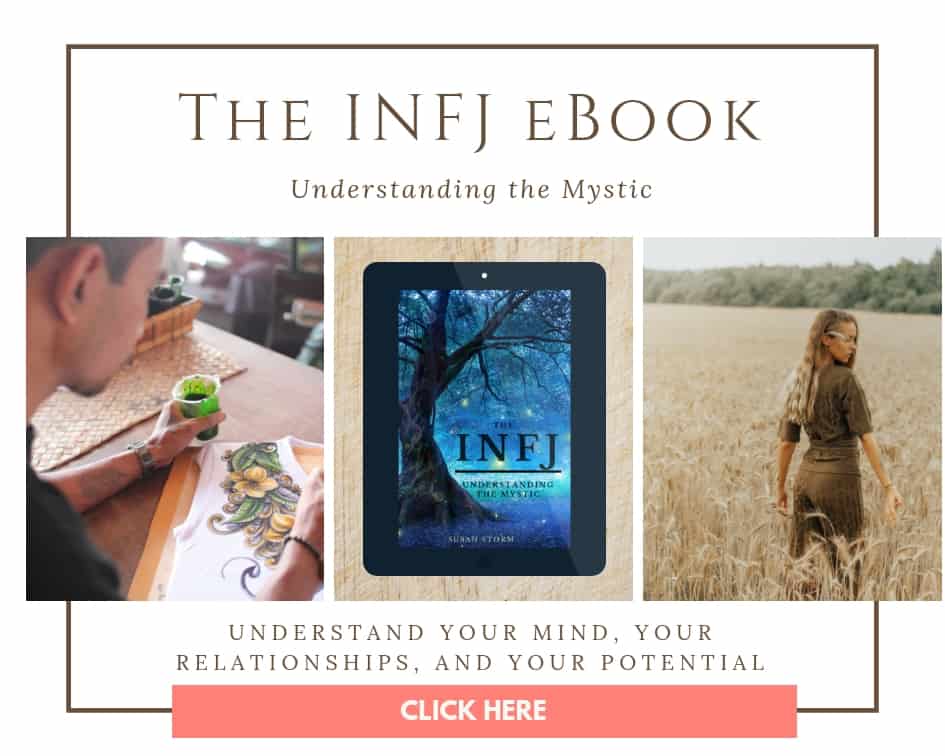
This article contains affiliate links. I only recommend products I truly believe in.
Like this article? Then you’ll enjoy these!
The Four Reasons INFJs Struggle with Loneliness
The Top 7 Gift Ideas for INFJs
Are You an INFJ or an INFP? Clarifying the Most Common Mistype
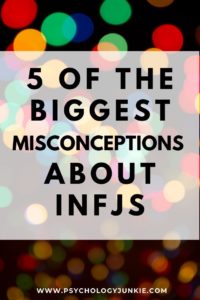
Get Your Free INFJ eBook
As a thank you for subscribing to my newsletter I will send you this free eBook PACKED with self-care tips, creativity hacks, and more! You'll also get a 3-day email course for understanding your personality type better!


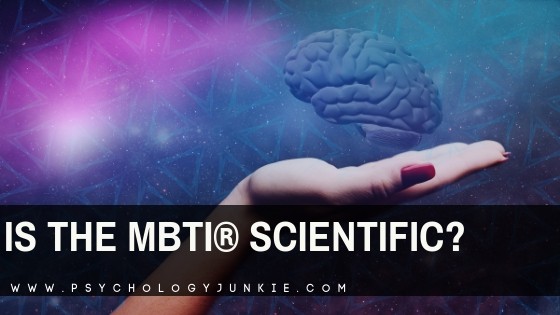


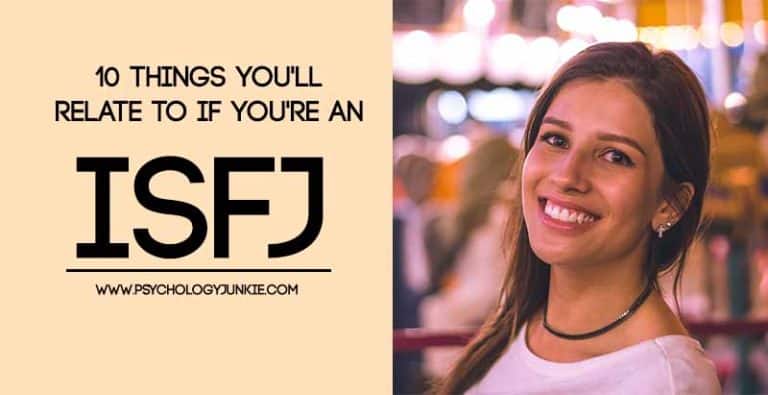
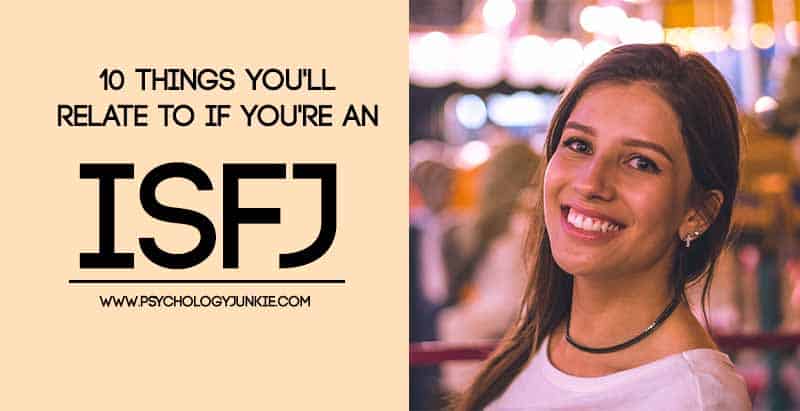


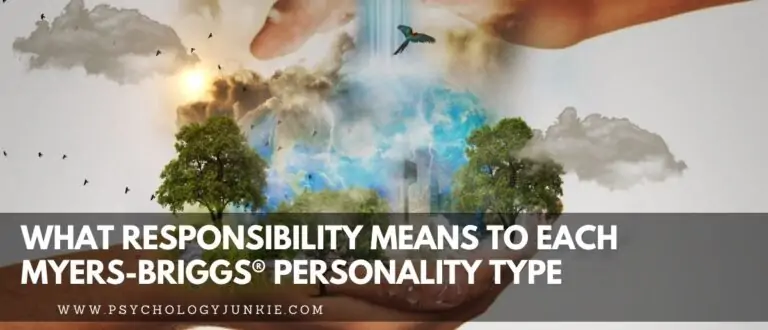
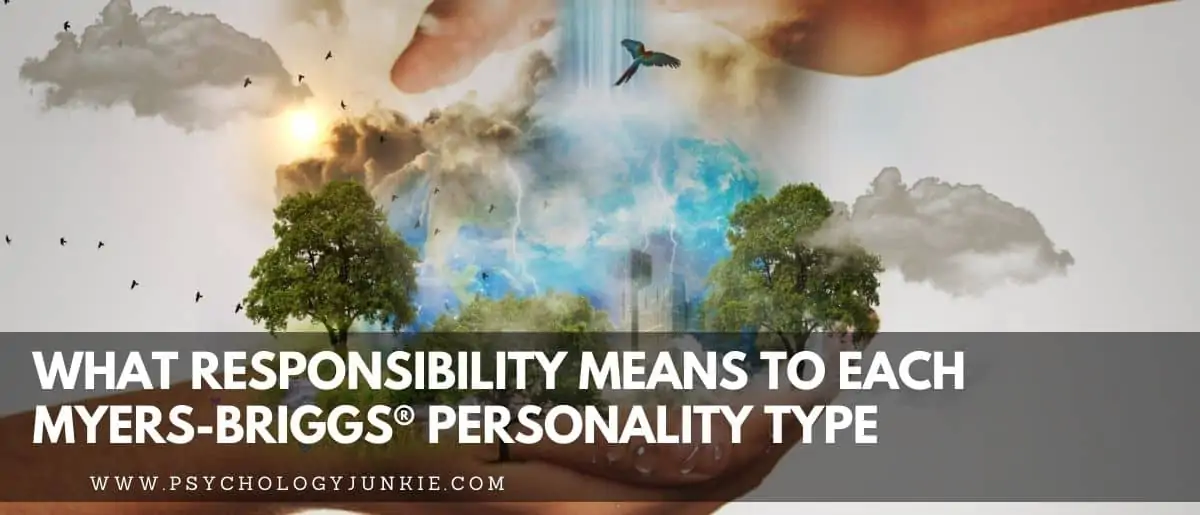
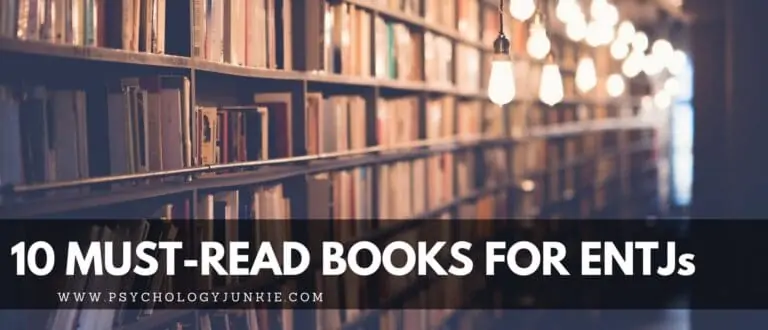
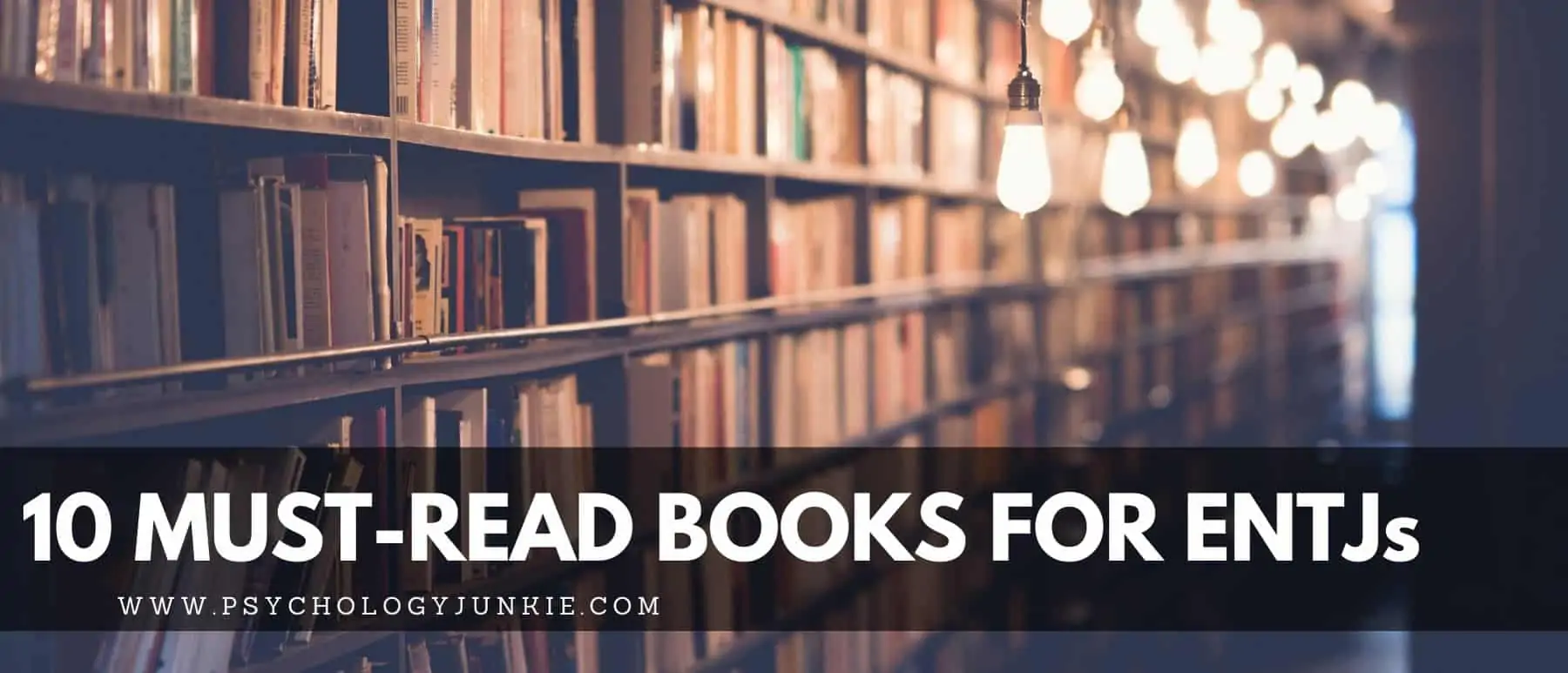
I really like this article! I have definitely recognized the consistent INFJ result on popular typing websites. I am very skeptical to make my friends take it, as most of them do end up receiving INFJ. Now I try to make them take cognitive functions test (which still aren’t always accurate) and try and see which type they most likely are. Anyways, I agreed with every single bullet point! First, the idea that we are supposed to be super emotional leads many people to think I am an INTJ, but, as you said, I lead with intuition; my Fe is rarely what you will see. Second, I’ve found in general with NFs, they tend to be extremely big picture-focused, rarely excited about diving into the details, so AMEN on this one. Your third bullet point, don’t even get me started. I see this everywhere on the internet (and my friends tell me I am also) that INFJs are really secretly extroverts/ambiverts. Just because we are able to be friendly does not mean we are not drained by people, sorry ;D. And for 4 and 5, exactly. I hate seeing everywhere that INFJs know everything about everyone using their psychic abilities! Yes, I do pick up on a lot of unsaid things, but it’s pattern recognition, not a super ability! Lastly, I love your statement, “The INFJ personality type is unique and wonderful in so many ways. But so are all fifteen other personality types.” Great article!
So, what would be a more reliable test to determine my type? According to an online test I have taken, I am an INFJ ( with T tendencies).
I feel mixed about this article.On the one hand, i want to know my true personality type and not read general things about a type that i believe it’s mine.On the other hand however, I have taken a personality test ( which i’m not sure whether it’s “official” or not,here’s the link https://www.16personalities.com/ ),and the result was infj. So, while I do believe that I’m an infj (and what i’ve read about this type both in this site and in other articles seem to match with me mostly), I also want to know the truth about myself and not some kind of fake impression about myself. Your article quite literally triggered a war inside my head, with one side supporting that I’m an infj, and the other saying “But what happens if you aren’t?”.I don’t want to lie to myself (especially in something so serious as my personality), but i also want to discover more about who I actually am.
I took the same test and got either INFJ or INFP each time i took it. I spent a week reading about all the cognitive functions and concluded that i am INFJ. It can be a bit confusing and take a lot of time to understand, especially if you don’t realize how you process information, but understanding which cognitive functions you use will get you your answer. (Try watching MBTV on youtube)
This is so accurate,
I’ve always wondered if I was truly an INFJ
Because of things other people say about this type, which turned out to be not true!
Common sense killed me ????????????
This is the best INFJ article of all, because it gets across that all 16 personaliities are equally as good as each other and also it doesn’t make me embarassed by other INFJ’s who think they are godly due to the many misconceptions that are highlighted in this article!
I used to be fascinated (obsessed, really) by the MBTI and read everything MBTI-related I could get my hands on. I typed as an INFJ about 20 years ago, in high school. My Dad’s corporation was using it and Kiersey’s “Please Understand Me” as a tool for building teams and making better use of individual strengths. He brought the materials home and we all took the test, which was the long version with over 100 questions and took about two hours to complete. My father and brother typed as INTJ, and my Mom as an ENFP. Because of the two INTJs and one INFJ in the same household, we sort of didn’t take the “rare” part seriously.
But as I got older and saw more of the world and the people in it, I soon realized that we were, indeed, a very unique family. We did things very differently from other families. We thought differently and had very different values and goals than most of the other nuclear families I met.
Now that I’m twenty years older and have read about all the types for years, I do feel quite confident that I am an INFJ. I’ve taken the long, official test (the one you pay for) three times now and it always comes back the same. But I’m sick of the whole INFJ persona that has taken over the internet. When I first started learning about it, the details and insights were gritty and hard to swallow. We’re not mystical unicorns floating above the ground and being the perfect friend or partner to everyone. I can sort of see how others might come up with that image, but that’s not how it looks from in here. And I’m beyond sick of the incredibly disproportionate representation of so-called INFJs who are diluting and obfuscating the true nature of the INFJ, which is more uncomfortable, bizarre, and annoying than people are willing to believe for some reason.
It is not fun being an INFJ. There are lots of cool things about this type, but I can tell you the number of times I have wished I could be a straightforward personality type numbers in the thousands. It’s hard finding friends who like you enough to tolerate your inconsistencies and flakiness. It’s almost impossible to find people who actually understand why you are the way you are. I can explain why I feel a certain way about something, but it sounds insane to my own ears even as I say it.
My personal favorites of the misconceptions you busted are the ones about being detail-oriented (gods, no) and being ambivert /extravert. I am not, NOT detail-oriented, but I keep getting pegged as such. I NOTICE every detail, to the point people think I have a sixth sense. I can tell if someone has been in a room recently. That seems mysterious until I point out that I can still smell the person’s cologne/deodorant/body wash, I can see the dent in the couch from their butt and I noticed a long time ago that butt prints in that particular couch take several minutes to disappear. Noticing details and having an insane memory is not sexy, though… being “mystical” is. Ugh.
Ajd the ambivert thing, please. PLEASE. I am DRAINED by being around people, even those I love dearly. In fact, when I am peopled out, I can’t even get relief from being with my nearest and dearest. Not even the love of my life! I need to be ALONE. I don’t even want a pet near me. This is extreme even for me, but that’s how bad it can get for me. Even at my best possible recharged state, I have a definite and limited amount of energy to spend on being with other people. My level of introversion is such that it is off putting to all but the most determined friends and family. Most people get tired of waiting and move on.
I also love that you corrected this idea that we wallow in our emotions. We do not. My therapists in the past have all said that I am unique in that I feel things intensely, but I am also removed from it because I’m analyzing it and using the information to further my projects, none of which have much to do with my OWN feelings, but rather those of others.
Thank you for writing this. I’m so tired of the fantasy hero figure version of the INFJ that’s out there. It makes it harder for the real INFJs to ever be appreciated for who they truly are.
Thanks for reading the article and for sharing your perspective! Yes, I’ve felt very similar to how you describe feeling. I’ve gotten very tired of the delusions of grandeur that are apparent in many articles about INFJs and wanted to kind of bring it down to earth a little bit (as much as you can with the INFJ type anyway). I myself have had to learn and revise information I’ve written over time; even some of my older blog articles I had to delete because I realized after more study that things weren’t 100% accurate. So I understand why there are misconceptions out there, but some are worse and becoming worse every day. Again, thanks for sharing your thoughts and comments!
Amen to the psychic abilities mumbo jumbo rebuttal. The single one pet hate I have when reading about infjs is this. Unfortunately too many believe in psychic abilities then self type as infj which leads to infj forums populated by non infjs and why I don’t even bother with any of them. It’s ironic when an infj forum of non infjs kicks out an infj for disagreeing with their echo chamber psychic abilities love-in
Thank you! Excellent article! I agree! Too many people claiming to be INFJ that probably aren’t, too many articles saying we have superior abilities that come across sounding egotistical and “always right”. I love learning about this, but I read so many articles that outright contradict each other – where is this information coming from? What is it based on? Things like “INFJ’s dress well and have lots of shoes”. People who like shoes and want to spend money on it have lots of shoes – regardless of personality type.
I feel I have researched this A LOT to say I am a true INFJ. I enjoy reading about personalities – all types – to understand and appreciate how we all are special, and have something to offer the world. It has helped me to understand why I so often feel alone without a deep connection with many people but, I have to be careful that I don’t use this information for a pity party or to feel superior. So, while this has some value, I’ve learned not to put too much of my time into it or put too much stock in it.
Thank you for this.
Too much personal thoughts were given. I felt as the article went on it got further away from this statement at the beginning “I’m going to use information from Carl Jung, Isabel Briggs-Myers, and other typologists who’ve put in a lot of study and time to clarify the different types.”
I’m an INFJ and I LOVED this article! I always felt uncomfortable with all these misconceptions, especially the idea that we are “ambiverts”. I’m not. I’m an introvert through and through. Just because I can function well in social situations, that doesn’t mean I’m any less of an introvert. The misconception about the attention to detail resonated with me a lot, too. I’m completely blind to environmental details. I can spend a whole day in a house, and not remember the color of the walls when I leave (this makes my mom crazy, because she loves architecture and always want to know every detail of the places I visit). I just don’t pay attention and don’t care to. On the other hand, I’m great at remembering details about people, especially when they tell me information themselves. I’ll easily remember your birthday, your favorite color, favorite song, etc. But the color or your kitchen’s floor? Unlikely.
Awesome article, really. I’m going to save it for future reference, haha!
Me too! I love how this article clarified all this. I also hate when I see articles, etc. saying things like “we know you better than you know yourself”. That is so not true! We might be especially intuitive and able to pick up on and understand other’s feelings and emotions, but its not like we’re mystical mind readers or something! And I also can be very oblivious of my surroundings lol. I tend to not notice little details because I’m too busy with the ‘big picture’. And don’t get me started on ‘we always know when you’re lying’ =/… Again, we pick up on feelings and emotions, and I usually subconsciously seem to know when someone’s lying, but I also tend to give people the benefit of the doubt and hope they’re being truthful. So I can be a little gullible in that way, wanting to go with my heart instead of my intuition and gut feeling. There have been so many times when I wanted to believe someone even though that little voice was telling me they’re lying, and I give them the benefit of the doubt but find out later they were indeed lying. I’m starting to learn to listen to my intuition more now, since its usually right. 🙂
Andressa, YES! Me, too. Drove my sister, an ESFJ, nuts.
“Groundless embarrassment”: absolute worst part of being an INFJ in my experience. Thankfully, this gets better with age.
I’m an INTP, but my former counselor was an INFJ. She was one of the least emotional people I’ve ever met.
As someone who just recently realized I’m an INFJ after two decades of identifying as an ENFP, the relief I feel at it being “ok” to not like people as much as I thought I was supposed to, and it being “ok” to be more of a stodgy planner than the footloose party person I thought everyone preferred, is somewhat mitigated by the “special snowflake” references I keep seeing in these articles (which are very good). What…I just got to mental freedom-land and already there’s a negative stereotype waiting? Darn!
I don’t know about other INFJs, but I’ve spent most of my life wanting to believe I was something I wasn’t–outgoing and spontaneous–and unconsciously belittling what I really am, because I equated being introverted and having a plan with being mousy and boring (respectively). But now, apparently all this is in fashion. So much so that some people are calling it “special snowflake,” apparently. Are the people using this name jealous or something? Or, are other people, wanting to be perceived as sensitive and mysterious, mistyping themselves as INFJs and then being obnoxious about it?
Who knows? All I know is that I feel relieved to have discovered my real type and finally laid down the unreal, party-girl mask I’ve worn all these years. If that makes me a “follower” of some new trend that I wasn’t even aware of, then so be it. I’m the real deal…Bring it on, snowflakes. 😉
Articles like this have helped me figure out that I may be an INFJ. More so than an INFP. There were times I thought I was an INFP (or even INTP) based on the description (can get it on tests because of the Se difficulties with the upkeep of daily chores and clearing clutter prevented me from answering in favor of the “organizer” type questions.) but still not quite fit. One key thing that stood out was the authenticity, that INFP’s are good at. It isn’t the same for me. It’s hard to base authenticity on a moving target. (how I see myself, it is what I make of myself at the time I think over my thoughts.) I’ve always had a distance between my own emotions and my thoughts. (the thought loop coming on with more clarity than the emotional one) I wondered why stressed out and angry people had such a negative effect on me.
It is a comfort to know that I am not alone.
Thanks, also for the bit on the stereotypes and myths. I’ve had a few rare dreams that did seem to predict the future and not be far off, but those were likely flukes than anything else. My ability to read people’s emotions does a lot better if I’m not spending that time in my head plotting out stuff.
This article is probably the most accurate article I have ever read about INFJ’s. I loved how you discussed about how INFJ’s are actually quite normal. I think that too many people see the statistics about the “rarity” of an INFJ and think that they are this deeply misunderstood person when in reality I think that everyone feels misunderstood to some extent. I found, especially that INFP’s feel very deeply misunderstood, even though they are not the minority of all of the types. I happen to believe that feeling abnormal is actually normal… but i also do believe that extraverted feeling is more likely to not notice their abnormalities because when they are with people they tend to “mirror” others’ actions. But that is just my own perspective.
Thank you again for writing this article. I hope that many people will read it and be able to understand the INFJ a little bit better.
Thank you for your input! Yes, I completely agree that all people feel misunderstood in some way, even the most common types out there! I think that’s why the INFJ description resonates with so many people from all different types. I’ve known severely misunderstood ISTJs, and they are a fairly common type, but they do tend to get misread quite frequently I think! I’m really glad that you enjoyed the article and I thank you for your feedback 🙂
I identify as an INFJ, and have worked with a life coach who confirmed I was as well. I know we aren’t special or better but given all the other practical problems I face just being myself- I think it would be nice to know that this suffering or failure to break out of this shell – is at least something unique. This sounds arrogant as I know everyone has their own struggles – but I see so many downsides to being this type – its uncanny. Given a choice I would be anything but this – theres so much self hate that comes along with being this way.
I loved your thoughts! I found all of it accurate especially the “groundless embarrassment!” I, as a legit INFJ deemed so through the real, deal MB assessment in college (versus an online trimmed down version) and discovered through life in general, was concerned by the apparent number of those like me was enormous compared to what studies have shown our rarity to be. Stuff about INFJs is everywhere and everyone seems to be one. Thanks for clearing that up.
The infj personality is the closest to my personality an I agree with you I don’t care about putting titles on me or others but due to the fact infjs and my own personality could be very different according the severity and differences in our child hood infjs are a very complex personality as is the human mind in general that’s great that is it is important for us to have an identity helps us cope and fit in infjs are unique in there own way as human beings in general we are not as different as some would like to think everyone that takes this test are infjs one could find similar thought process coping mechanisms or the true introverted traits in there own personality. sorry about my rambling I don’t get to talk to people much on this matter I do a lot of thinking in terms of patterns I have done this since I could remember as well as some of the infjs personality traits do to my hard upbringing I had no choice but grow up fast and Being on my own since 17 by the time I was 21 I submerged my self in alcohol drugs running from my past.i don’t behave this way no more because that was not me.i still have a strong urge to help people even those who brow beat me in to the ground when we give up on people that’s when we lose sight of what needs to be done in a this unbalanced world.it is better stop an fix it then leave broken then walk away and leave it broken.this is some of the reasons I will not judge others .
I really loved this article.. I m an INFJ Type 4W5.. and i ve always been asked by my INTJ frirnd about “the knowing about others more than themselves “telling me it s nonsense.. i couldn t agree more. I like to internally analyze others’ feelings and o ly few times I mention what I grasped from them, but also many times I find it hard to define exactly what others are going through because some basic informations couldn be hidden or unavailable..
The first thought that came to mind after I finished reading this was, “Thank you!!”. Over the years I’ve taken multiple versions of the MBTI–some as far back as 20 years ago taken on paper, not one of the online tests–and I remember I used to get so upset at consistently getting the INFJ result because it wasn’t what I wanted to be. I was young and wanted to be extroverted, social, exciting, etc.
Now that I’m more comfortable with who I am, I find myself feeling exasperated yet again, but this time by some of the articles online about INFJs. This particular article said exactly what I’ve been saying for years. It’s just patterns. It’s all just patterns. That’s how I figure things out. There’s nothing mystical or psychic going on. Just patterns that are put together with a bit of subconscious intuition as glue to hold all the pieces together.
It’s almost funny in a way because as a teenager and young 20-something year old, I didn’t really want top admit I was an INFJ (if the people I was talking with even knew what the MBTI was) because I thought it was embarrassing to not be as outgoing and social as I kept being told I should be. Now at almost 40, I don’t want to tell people I’m an INFJ because of all the misinformation and it seems to be some kind of weird trendy thing going on that everyone seems to want to be one.
What a strange world we live in.
But the article was good. One of the best I’ve found online. Cheers.
Perhaps the most interesting aspect of MB is one’s efforts to find where one “fits; ” we want to KNOW! I am still fascinated with this study but at this point in life, much less focused on determining what I am. I just BE.
Thank you for this insightful article!
Thank you for this. It’s confusing as heck when I read something about INFJs when they’re describing INFPs in reality, or some other type. It’s disconcerting. I’ve been known to be overly emotional sometimes, but mostly because of self-esteem issues, and also it seems to be a family trait along the patrilineal (dad, me, rather more emotional than average, though my dad hides it a lot now).
One more thing. I try to answer the PH test as honestly and authentically as I can, and I keep getting the same result. I try to answer as if it’s the first time doing it.
I feel that this article is purely biased because you want to define what an INFJ personality should be and is. If these “misconceptions” are not true, then why do most of the explanations explain my character or persona to a tee? Guess I have a mental issue to look after then…Also i took the MBTI in college. I have not met another being who feels the same way as I do, having the characteristics of an INFJ. So it is kind of a weird statement to make that they are everywhere because I never had anyone share the same viewpoints as i do about the true issues of our society.
Hello,
I hope to provide some useful insight if I can. “If these “misconceptions” are not true, then why do most of the explanations explain my character or persona to a tee?” – If the misconceptions about the INFJ are what explains your character, you are probably mistyped. Also, just because the author wants to define what an INFJ personality should be and is, doesn’t mean they are biased; the entire mission statement of MBTI is to define and categorize personality so as to better understand other people.
Finally, INFJs have auxiliary Fe, so when you say, “I never had anyone share the same viewpoints as I do about the true issues of our society,” It doesn’t really strike me as an INFJ. If anything, you should share some, most or (rarely) even all viewpoints with ENFJs and other MBTI types with similar functions. INFJs feel pretty misunderstood generally, yes, but having NEVER met another person like you? It seems to me like you got caught up on the fact that INFJs are the “rarest” personality (not that that matters or means anything at all – technically, 1.5 of every 100 you met will be INFJ) and stuck to the mistype because that sounded right to you. I’m not saying you’re not a unique individual, just to be clear, I’m just hoping that’s not what you’re basing your typing off of. You say you took the MBTI test in college, but it is VERY VERY easy to mistype as INFJ.
Anyways, if the misconceptions here explain your character let’s look in to some possible typing. Emotionally sensitive and intense? That smells like Fi all over. I’d suggest looking into INFPs, who commonly mistype as INFJs, or ISFPs, which is also possible because they’re tertiary Ni may resemble the INFJs primary. Being detail oriented? That’s an Si trait. Look at ESxJs and ISxJs. Although I’m guessing since you tested INFJ you can cross the ESxJs off the list. Ambiverted? Honestly that one could be any type. Introverted or Extraverted isn’t necessarily how the person acts in public or whether they value time with other people, but from where they draw their energy. A true Introvert draws energy by being alone to recharge. Psychic/good at reading people is just an exaggerated term for the INFJs Ni/Se processing mixed with the Fe to use it on other people. This however doesn’t mean INFJs are the only ones good at reading people. Any developed, strong Fi/Fe user should have a good thermometer of other’s emotions and intentions.
Hope I could help.
Agree with what you have said. The Fi of Jennifer Gonzalez was on the spot even starting from her first sentence “I feel that this article is purely biased…”. It is very obvious that she is a mistyped.
Thank you – you’ve listed some of the very reasons I have felt awkward talking about the MBTI to some people. Admitting that I’m an INFJ used to feel like I was claiming to be a SuperSpecialPsychicPerson! who is inherently better than all those simple, common types. To avoid giving that impression in any way (despite the fact that I DON’T think that about myself, that only a small-minded narcissist COULD think that), I used to go overboard in describing and hyperbolising all my faults (‘I don’t notice physical things even when I literally trip over them! I can’t tell the difference between being hungry, thirsty, tired, or sick! My brain is like a washing machine full of socks: sometimes I can pull out a matching pair in the color I want, but usually I just end up with an armful of random oddities!’)
I’ve grown up and worked through many of my insecurities since then, to my great relief! One of things outside of myself that’s made a difference is the impact of blog-writing people like you. I’m particularly glad to see how you write about Extraverts and Sensors. There seems to be so much dismissiveness and stereotyping about those preferences on personality-focussed websites, and I think that is at least part of the reason so many people end up mistyped. Who wants to be someone uninteresting or second rate?
So thank you for refuting many of those ‘common knowledge’ stereotypes, and for listening to what people of various types have to say about themselves. I appreciate that I can send the ESTJs and ESFPs I know to your site, and they won’t read that they are rule-following robots or table-dancing airheads. 😀
It all depends on where you get your information from describing the different personalty types. Personally, I’ve never read that INFJ’s are revered as some super special unique beings or whatever. We are unique though and there is nothing wrong with that in the same way that there is nothing wrong with being typical. As I told my wife who is an ISFJ (the most common), thank God most people are like you, sweet, sensible, caring, and know when to speak up. But above all it’s the hospitality factor that is dominate in her. For myself, an INFJ world would be a disaster and I know it. We are here to listen, to help, to guide and assert ourselves for a cause that we believe in when we are brave enough to get out of our shells. The study of personality is intriguing but not nearly as complex as people make it out to be, we are getting too technical. Just read those 4 little letters and spell it out. In the end it’s what you identify with that makes you who you are. I am an INFJ…period.
Thank you!!! This is spot on. This article was spot on. I appreciate the truth written in theses misconceptions. I am an INFJ. And I thank you for clarifying to other that we’re not all knowing mystics and we can get it wrong. Just because I know things doesn’t mean I know everything. There’s only ONE who does. Again thank you for the clarification.
INxJ here. I seem to fall right in the middle and when taking any of the tests always know which questions ultimately determine the thinking/feeling aspect. When given two choices on those questions my answer is always “BOTH, of course”
Great article.. I especially related to the tidy up stuff. I’d like to, but that’s pretty low on list of priorities for me. I only wish it was easier to do those now “ present” things. ..!
Also the emotional snowflake thing rings true… I do have emotions ect. But my first tactic is to avoid them by thinking about stuff. And if needed , talking to someone about them. Seems only way( orcwriting? ) to even process that stuff.
I read quite a lot about people, and their ideas and moods ect but bluntly I’ve always found humans incredibly HARD to understand. Not easy. .. just my 2 cents worth.. finally. Feeling no one gives you proper credit/ effort ect doesn’t mean infj are vain or think we are better. If anything, I think we constantly question our own worth.. mostly not so dumb as to say I’m better, but I bet it might sound like that easily enough. Just saying.
Very well put! I’m happy to see an article that doesnt build up INFJs as angels/saviours/wizards. Im sure some INFJs possess incredible qualities, but a normal, everyday one (Hi!) is neither a world-changing visionary or mind-reading empath. We simply take in and process data in a particular way.
In regards to the first point about INFJs being more intellectual and less emotional – on a personal level, I absolutely agree. I think it depends on the INFJ tho, with those more Ti-focused being more philosophical and idea-friendly, and those more Fe-focused being more emotion and people-focused.
Frankly, I am not happy to have recently discovered that I am in fact an INFJ.
I think that many theorist make it sound more glamorous than it actually is. My life experience has for the most part been a lonely one. I’ve always felt admired even adored but never understood, never mind the fact that I could never understand myself.
Up until now, I am still unable to be vulnerable with another. This has failed me in love, romance and I can only hope to ever realise a deep connection with a significant other. And so, these, at my ripe age are still dreams.
Me too. I feel underestimated and like I am overlooked for opportunities constantly. I feel that people like and love me “for me” but not for what I bring to the table and want to contribute. It all boils down to being misunderstood. I don’t feel “lonely” as much as I’m beginning to feel like the path that I wanted for myself isn’t meant for me.
I was upset too. It was like I secured my inability to end the feeling of being different. Thanks for sharing.
I LOL’d at “ Source: Common sense”. ????
That had me rolling. I was like, yup. This an INFJ
I’m INFJ,but I’m happy,because I finally found my true love.
Of course,I have my ‘dark’ side,but it’s just a penchant. I like that side,but it’s often can become a way too dark even for myself..
Speak for yourself I’m a empath and I know how to heal people
Thank you for this article!
I’ve been working on proving myself on being INFJ after getting typed INTP quite frequently, then at other times ISFJ and learning that I was typed “upside down” or in reverse. I don’t want to be special, don’t think that I am, and wouldn’t consider myself a psychic or empath. This article has helped me in my quest for reassurance that I am understanding functions and seeing them at work in myself and others.
Good grief Susan. You need a better grasp of statistics. Or rather, basic math. Let’s review.
You claim that “But if you read much about type, or if you do know an actual INFJ (which is statistically unlikely) they are very true introverts by nature.” You also claim that “They’re supposed to make up a mere 1% of the population.”
Do you know what 1% means? It means 1 in 100. In this case, it means that 1 in 100 people will be INFJs. Tell me, have you met more than 100 people in your lifetime? And how many people do imagine are on the internet? I’m betting more than 100. So, given that most people do not live under rocks, it is actually statistically *very* likely that most people have met many INFJs. Stop trying to make yourself feel special. Statistically, it looks ridiculous.
Honestly, I spent my whole life trying to fit in, but it comes off as awkward and weird, I was neglected, verbally and physically abused by my biological parents, now I am in a foster home. I was and still am very suicidal, but I remembered one thing that made me feel accepted, “Whether you live or die. At the end, the most important thing is if you’ve found peace.” I now use my logical and strategic side to cover up my innermost emotions…
This article is exactly why most people don’t appreciate the scientific value of MBTI and think people who do are dumb.
Terrible understanding of…. Everything related, especially common sense.
Love these articles by “INFJ’s” who are determined to convince other people they’ve mistyped when they’ve taken the same test themselves and are convinced they are the real deal.
Love these comments by posters who are determined to convince other people that they can’t be sure of their own type when they’re not themselves and are convinced that others only type based on a simple test.
Nice touch!
Susan, are you an ENTJ or an INFJ? You’ve said both on this website. Which are you?
I am an ENTJ. Thank you for commenting, I thought I had fixed all my older articles where I had spoken as an INFJ (I thought I was for many years). I was typed INFJ when I got my MBTI certification and then after many years realized it wasn’t resonating with me and spoke to some other experts and found out where the problems were. I’ve been careful not to write my content from an anecdotal perspective (“I’m this type, so this is how you must be” that kind of thing) and rather I write from what I’ve learned in my certifications and trainings. I hope it is still helpful!
Thank you for writing this I agree I get misunderstood a lot. Especially the part about being detail oriented (I am not) and knowing people better than they know themselves. (I’M STILL TRYING TO FIGURE ME OUT!) I actually hate being an INFJ. So many people seem to romanticize it. I wish I could be almost any other type.
🙄
I’ve been typed as an INFJ on several different online tests, and everything I’ve read about it so far resonates with me, but it sounds like mistyping is pretty common. I’ve taken the DiSC personality profile test a few times over the years too, and every time my S and C scores are neck and neck for dominance and my i and D scores are both nearly non-existent; would that be consistent with an INFJ? Your explanation of the way INFJs gather information in a jumble and form an impression rather than focusing on specifics REALLY resonated with me. I’m a financial analyst/portfolio manager, and I analyze a ton of data every day, but my memory is absolute garbage, so if someone asks me for details about anything, I get extremely anxious trying to discuss it without having the data right in front of me (I’ve always had what seems like an irrational fear of miscommunication). Your article has me wondering if perhaps it’s less of a memory defect than an inconvenient aspect of the way my mind processes information…
I barely know I have intuition until it’s out. I have had rare psychic events. I’m an infj because of how I solve things; because of my gathering of knowledge through trends and behaviors. I’m an introvert. I will hurt myself before hurting another.
I was willing to take your comments seriously until I noticed that some of your information is incorrect. The Myers Briggs site states that INFJ’s make up 2.3% of the world’s population not 1% as you state. You complain about misinformation and proceed to misinform.
Hi Wendy! This article was written at least seven years ago so the statistics have changed since then. At the time I wrote this, the numbers matched what was on the Myers-Briggs web site. Since then they have changed. I’m glad you brought this to my attention because it alerts me to the outdated information. Thank you.